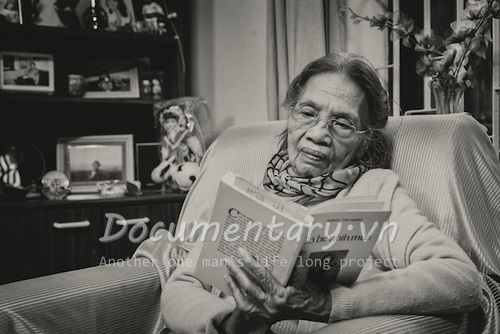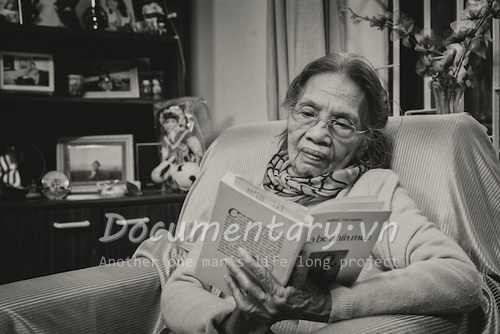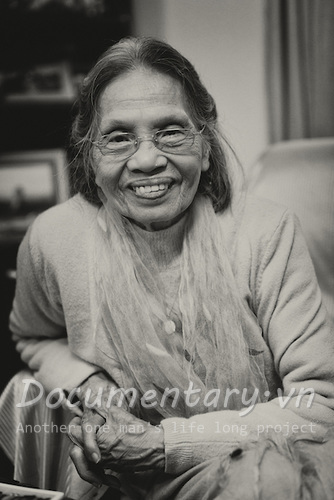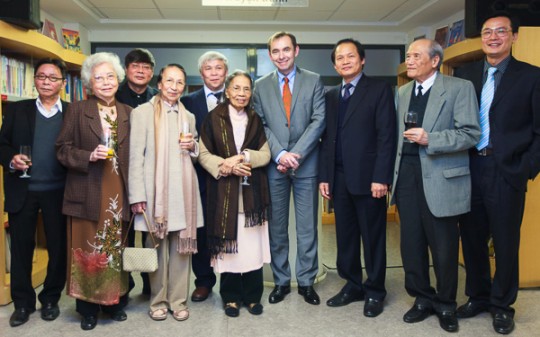

Associate Professor, Distinguished Teacher Dang Thi Hanh/Photo: Thanh Long
1.In the early 1980s, I first met Ms. Dang Thi Hanh when I was hired to work in the Department. At that time, it was called the team.Foreign LiteratureBefore that, she also taught my older brother at high school. It was through my brother that I learned more about her family. Building on her family's academic background, serious and straightforward personality, and meticulous academic approach, she possessed a solid and reliable expertise in French literature.
2.Since her retirement, she has rarely appeared in public or traveled much, not just now, at the age of 85. This is the opening of her memoir.The little girl looked at the rain.She wrote: “I was born in Hue, in a very memorable year, 1930. But my furthest memory of childhood, that is, of myself, is set in a village in Nghe An.” She was thin and looked rather austere, but in reality, she was an artist in her perspective on life and people; a compassionate soul. She was radiant, laughing heartily, and naturally cheerful whenever her articles were published in newspapers.Arts and CultureOr even in a literary magazine whose name might sound unfamiliar, located far south of Vietnam. This is understandable: these are intellectual offspring born from meticulous academic work, a deep understanding of life, quiet yet full of compassion and emotion. This influences her writing style, grammar, and word choice. Anyone who has interacted with her can see that she is not a talkative person. On the contrary, sometimes her language seems unable to keep up with her thoughts – at those times she stumbles, but not becomes disorganized. Sitting on the thesis defense committee (in the past when she was still working) or occasionally in recent years, when she agrees to review some theses or dissertations, listening attentively, one can learn many things that might take months or years to absorb. These are issues of literary theory or observations on the art of a particular writer. That stumble, I think, is precisely the abundance, the overflowing richness, sometimes unconsciously manifested in sentences that seem grammatically incorrect. Her handwriting is beautiful, old-fashioned, and easy to read, but sometimes it's also "winding" and elegant, with arrows pointing to margins in places added due to earlier "stumbles" where thoughts hadn't yet been organized. And, contrary to what I've said, her writing, once printed, is soft yet sharp, echoing experiences and knowledge, sometimes quite witty and cheerful.

Photo: Jackie Chan
3.She was a disciplined and exemplary teacher, but also a compassionate person in her perspective and thoughts about life. It's a pity she didn't write much. Perhaps it was partly due to overthinking and a reluctance to cause offense; and partly due to her health. Her eyesight wasn't good, and she had undergone several surgeries. She wrote slowly, but her writing was captivating. I particularly enjoyed her memoirs about her childhood, her hometown, and the people she encountered – from street vendors to famous figures. Those were truly beautiful pages of writing.Grandmother and grandchildThis is a memoir of two childhood worlds separated by more than half a century, written in a witty, lyrical style close to literary creations. As one writer once said, "the bite of time spares no one." The lyrical and philosophical reflections on life, on the countless fates of loved ones, flow gently and softly through each page of this memoir, preserved by the fading of time and held together by haunting lines of writing. These are spaces of reminiscence, of innocent, pure dreams, of cherished memories. In searching for lost spaces in Dang Thi Hanh's creations, she revitalizes the ruins of memories that time has eroded and erased in many others. Memories are given and received against a backdrop of oblivion, of the dust and ashes of human time. And here, the memories, so poetic, "seem much closer to oblivion than what is called a memory." Remembering and forgetting intertwine... Only a glance remains, a beautiful, clear, and melancholic light. A poem about lost days... She is not a professional writer in the sense of creating fiction, but rather a "historian" based on personal, family, and lineage memories. But the beauty lies in the poetic quality of truth, of reality experienced and contemplated.

Associate Professor and Meritorious Teacher Dang Thi Hanh poses for a commemorative photo with the Ambassador of the Republic of France.Jean-Noël Poirier and the teachers of the University of Social Sciences and Humanities, on the occasion of her beingThe French government awarded the Order of the Academic Palms in February 2013. (Photo: Thanh Long)
4.Her remaining body of work today, and perhaps even in the future, besides a considerable number of translations and articles published in specialized journals and magazines, consists of articles included in textbooks.History of French Literature, is a monographHugo's novelsor bookSome prominent figures in 20th-century French prose,Very insightful and profound. We are already familiar with Hugo, but reading her essays, that familiarity becomes strange. She analyzes almost the entire creative process of this writer's important prose works. Each of Hugo's works is examined in the light of narrative and structural theories, uncovering and discovering truly fascinating and compelling aspects. She applies theories of rhythm, structure, narrator, voice, time, space, etc., to her very convincing analyses of Hugo's novels. Each article is a work, a creation born from creativity. Like next to a stone Notre Dame Cathedral, there is also aNotre Dame CathedralOn paper – Hugo's immortal novel.
5.Each piece of writing is a dialogue with oneself, with others, with the times. What remains after a lifetime may be a great fortune, nothing at all, or a very high title, but I think, most fortunate of all, is to leave behind good books, where those who come after can read the feelings, the joys and anxieties, the happiness and sadness, the knowledge from life and books, and the unfinished dialogues, left for others to continue. In this memoir.Grandmother and grandchildHer writings contain a truly profound quote: "It is precisely because everything in this world, without exception, must rise and fall with Time: thus the faces of things in this world change, both the centers of kingdoms and the land registers of empires."
Only memories and affection remain, as the sentence seems to suggest.
|
Associate Professor, Distinguished Teacher Dang Thi Hanh
+ Workplace: Department of Foreign Literature, Faculty of Literature (Hanoi University).
History of French literature in the 20th century(Editor),Foreign Language Publishing House, 1993. Grandmother and grandchild(Memories),Women's Publishing House, 1994. Some prominent figures in 20th-century French prose,Da Nang Publishing House, 2000. Hugo's novels(Discourse),National University Publishing House, 2002. The little girl looked at the rain.(Memories),Women's Publishing House, 2008. Translation: Letter from Hanoi by Jean Tardieu Deformationby Kafka |
Author:Assoc. Prof. Dr. Dao Duy Hiep